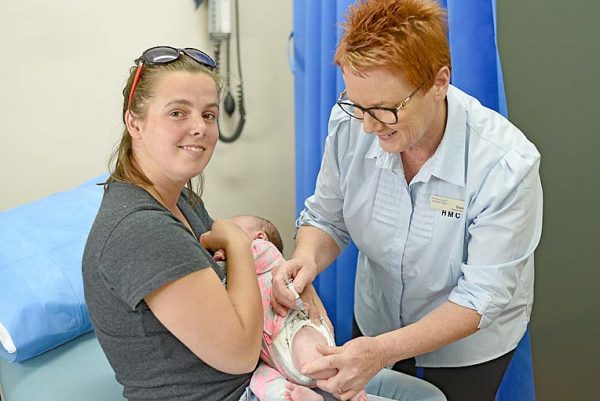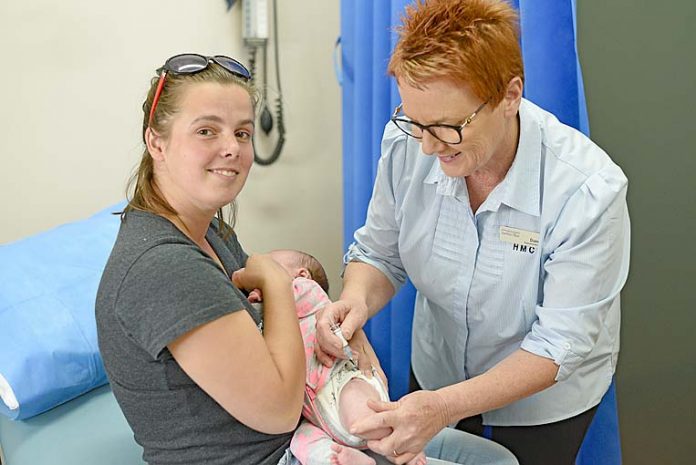
MOUNT Gambier residents are rushing to medical clinics in the city this week to receive a vaccine to help protect them and their children from a life-threatening disease.
The “huge rush” of vaccinations against meningococcal disease B-strain follows two reported cases in just two weeks.
The spike follows the tragic death of six-month-old Jordan Braddock less than three weeks ago and a 15-year-old Mount Gambier High School student contracting the disease this week.
Hawkins Medical Clinic has put on additional resources to cope with the extra demand as the two cases trigger alarm across the community.
Registered nurse Diane Saunders said the clinic was “totally inundated” two weeks ago following the death of the young baby.
“The phone went crazy and there was a huge rush on vaccinations – we did lots and lots every day,” Ms Saunders revealed.
“We have done about 10 vaccinations a day since, keeping in mind we would have done one a fortnight previously.”
Ms Saunders revealed there was also a flurry of phone calls to the clinic’s triage desk this week after a meningococcal alert was sent to school parents.
“Once parents received that text from the high school, the phones just went crazy with parents asking what they should do,” she said.
The nurse said the clinic had helped to calm people’s fears by getting them into the duty doctor.
“We have lots of appointments available every morning and we are not telling people we cannot fit them in for a week – there is none of that,” Ms Saunders said.
“We have been putting people into appointments so they can discuss it with their doctor and so they can get the vaccine – we do not want people stressing about it.”
Clinic partner Dr Mike Bruorton described the two cases in two weeks as “uncommon” and called for people to be vigilant in terms of monitoring unwell children.
While arguing parents should not panic, he said they should consider vaccinating their children given the B-strain was the most common meningitis strain.
“If they want them to get fully covered, then they must get meningococcal B-strain vaccine – that’s the bottom-line.”
Dr Bruorton also urged parents to keep watch on children who fell ill, were not recovering and appeared to be crashing.
“Always get them reassessed,” the GP said.
He said the two high risk categories for meningococcal disease were newborns to five years old as well as young people aged between 15 and 20.
Dr Bruorton also supported calls for the B-strain vaccine to be placed on the national vaccination program.
“If the disease does not result in death, there is potential for long term health consequences, including loss of limbs.”
Ferrers Medical Clinic practice manager Anne Bierwirth confirmed there had also seen a spike in inquiries for the vaccine.
“We have had many calls and inquires with the recent reported incidents in our region and subsequently an increased number of patients electing to have the vaccines,” Ms Bierwirth said
She said the vaccines did have a cost associated with them.
“What we advise our patients in line with department of health advice is meningococcal disease is a rare but life-threatening infection,” Ms Bierwirth said
“It can affect people of all ages, but is especially serious in children, teenagers and young adults. Vaccination is the best protection against meningococcal disease.”
Ms Bierwirth said early diagnosis of meningococcal disease was “very important” so treatment could start quickly.
“It is sometimes difficult to diagnose early because the early symptoms of meningococcal disease can be similar to other illnesses,” the clinic manager said.
“Seek medical help immediately if you think you or one of your family members has meningococcal disease. If necessary, call an ambulance or go to the emergency department of your local hospital.
“If you have any questions about the vaccines that are available and or the costs, do not hesitate to speak to your local GP or health service.”








